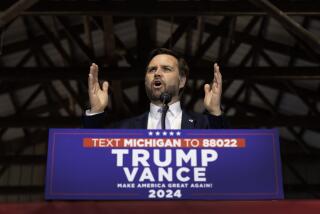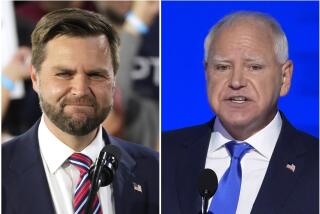Quayle Tries to Shore Up Support, Build New Image : Politics: Success of vice president’s fresh start could affect Bush’s chances and his own prospects in ’96.
- Share via
HOUSTON — Four years after he made one of the most disastrous national debuts in U.S. political history, Dan Quayle wants a second chance to make a first impression.
The vice president has come to Houston to prove he is neither the buffoon darling of the late-night comedians nor the tongue-tied pretty boy of the 1988 Republican Convention, but a mature politician who can help boost his party’s ticket.
And although President Bush carries top billing and the heaviest burden in this political variety hour, Quayle has also taken on an assignment he cannot afford to botch. He must inspire the Republican faithful, impress the broader American audience and leave no opening for the critics to again make him a bull’s-eye for their arrows.
“He and the President have identical missions: They’ve both got to give the performances of their lives,” said Lyn Nofziger, who was White House political director under Ronald Reagan.
Another washout could threaten the prospects of his boss and his party--to say nothing of his own ambitions as a conservative candidate in the 1996 presidential race.
His task is fraught with complications. Among them is the fact that his most important role for the Republican Party--as partisan hit man and megaphone of conservative ideology--is one that invites searching press scrutiny and the kind of attacks that magnify his mistakes.
After he arrived in Houston on Monday morning, Quayle plunged right into that familiar partisan role. He told a supportive audience at the American Israel Public Affairs Committee that Democrat Bill Clinton is no match for Bush on foreign affairs.
“Bill Clinton’s foreign policy experience is a summer internship with the Senate Foreign Relations Committee,” he quipped.
Then, in a dig at Clinton’s plans to trim the military budget more than Bush, he added: “With a military one-half the size of the current one, could we have saved the world from Saddam Hussein?”
He also appeared at a “God and Country Rally” and, later in the day, at the Astroarena, where he warmed up the crowd for Bush--who took to the stage to praise his vice president.
But the cheers that greeted the vice president on his first day at the convention will have to see him through some rough spots. This week Quayle can expect commentators to regularly remind their listeners that for nearly two weeks in July, Washington’s hottest topic was not the weather, but whether the 45-year-old Indianian should be jettisoned for a running mate with fewer negatives.
At the Astroarena rally, Bush once again sought to extinguish the “dump Quayle” rumor. Praising Quayle’s stand on “family values,” Bush said: “He has been a super vice president, and he will be for another four years.”
And Reagan departed from his prepared speech to the convention Monday night to give Quayle a boost. After saying, “We need George Bush,” Reagan said, “We need someone else too. . . . We need our vice president, Dan Quayle.”
Quayle’s convention-week schedule includes about 20 speeches before a spectrum of groups, and an appearance before several state delegations--including California’s--but he will stick to his old messages. “Any new ideas or announcements will be done by the President,” he said.
The vice president will repeat his frequent theme of the differences between the two parties and seek to portray the Democrats as the party of taxes, regulations, interest-group politics and non-traditional lifestyles.
“I’ll be re-emphasizing the ideological heartbeat of the Republican Party,” Quayle said.
But most important, he wants to use the convention much as Clinton did--to “reintroduce” himself to a public that knows him largely as the caricature drawn by his detractors.
“I hope I have this opportunity to somewhat expose myself to the American public like I should have been introduced in 1988,” the vice president said in an interview aboard Air Force Two, the vice presidential aircraft. “Let’s face it, there was no introduction of Dan Quayle on Dan Quayle’s terms to the American people. It was strictly done on the Democrats’ and the media’s interpretation of what I was all about.”
And the interpretation was disastrous. Bush’s stunning announcement on Aug. 16, 1988, that he had chosen a little-known senator set off a mad search for information that turned up questions about Quayle’s wealthy family, his Vietnam War-era National Guard service and his academic achievement.
When the TV cameras focused on Quayle, they found a politician who struggled for answers about his own life and about what he wanted to accomplish.
His performance during his ’88 acceptance speech was also widely criticized. “He was so wooden; he was so stiff,” a Quayle aide acknowledged.
The instant analyses said Bush had chosen a No. 2 who represented youth and appealed to women, but would never threaten presidential authority in the manner of a Sen. Bob Dole (R-Kan.) or Jack Kemp.
“There was immediately controversy, and even some people in his own party were asking if he was the right choice,” recalled Quayle’s friend and former colleague, Sen. Richard G. Lugar (R-Ind.).
The commotion of the first few days began a long campaign slide that led ultimately to his embarrassment in the October vice presidential debate, when the Democratic vice presidential nominee, Sen. Lloyd Bentsen of Texas, delivered the coup de grace . In response to Quayle’s efforts to liken himself to former President John F. Kennedy, Bentsen cast a withering stare and said: “Senator, I served with Jack Kennedy. I knew Jack Kennedy. Jack Kennedy was a friend of mine. Senator, you’re no Jack Kennedy.”
This week the vice president and Republican officials hope to undo some of the damage with speeches and presentations that will make him look less the privileged Hoosier princeling and more an average youngster from the pages of Boys’ Life.
These biographies will touch on the way Quayle attended five separate public schools as a youth, and how his family once lived in a modest two-bedroom house where he and his brother shared a bedroom and everyone shared a bathroom. The vice president says the delegates will also be told that he worked while in high school and college and that he attended law school at night.
In recent campaign swings, Quayle has delighted in describing to friendly crowds how he spent summer evenings like any average Huntington, Ind., teen-ager, cruising by the A&W; Root Beer stand after dusk.
“It will be an opportunity to touch on the roots . . . it won’t necessarily be the caricature that is out there,” Quayle said.
The campaign will try to convey the new Quayle image through the vice president’s acceptance speech, which will come Thursday just before the President’s.
A film clip about the vice president will be shown to the convention Thursday night. And Quayle’s life will be touched on in the nominating speech by William J. Bennett, the outspoken former education secretary and director of the White House Office of National Drug Control Policy; in three seconding speeches and in a speech of introduction from Sen. John C. Danforth (R-Mo.).
In allowing a national audience a new look at him, the convention “gives him a chance to rectify all that’s been said,” said Steve Merksamer, a veteran Republican strategist and a friend of the Quayle family.
How much can he do to change his image?
Quayle is likely to score points again with the conservative base whose support he has recently worked so hard to cultivate, analysts say.
But even if he manages to sidestep all gaffes, he will have a very difficult time changing a popular image that has calcified over the last four years, many analysts believe.
“I don’t think there’s anything he can do,” said S. Robert Lichter, a media analyst and co-director of the Center for Media and Public Affairs in Washington.
“He’s been portrayed as a cross between Bozo the Clown and Spiro Agnew,” he said, referring to Richard M. Nixon’s former vice president, who crusaded against liberalism in the late ‘60s and early ‘70s. “He can’t escape the image set by the late-night comics.”
Lichter’s group concluded in a recent study that between May and July Quayle got his worst battering in the press since 1988.
It found that the number of Quayle jokes on late-night TV had tripled, from about three jokes per week in the first four months of the year to 10 a week in the subsequent three months.
Sample: “Reporters asked Dan Quayle what would be the solution to global warming, and he replied, ‘Central air conditioning,’ ” NBC’s David Letterman observed in June.
In Lichter’s view, simply filling the traditional vice presidential role--rallying the faithful and attacking the opposition’s ideology--will always make it difficult for Quayle to overcome his PR problem.
“He’s doing work the party needs to get done,” Lichter said. But the more he directs attack lines against such pop-culture icons as TV character Murphy Brown, the more he will draw the fire of political opponents, commentators and comics.
“I view the whole thing as Quayle falling on his sword for the good of the party,” Lichter said.
Larry J. Sabato, a University of Virginia political scientist, analyzed Quayle’s stormy debut in his book, “Feeding Frenzy: How Attack Journalism Has Transformed American Politics.” He found that in the first 10 days after Quayle’s selection, the TV networks devoted between two-thirds and four-fifths of their political coverage to Quayle’s problems.
Although he says Quayle will obviously face nothing like that ordeal, he says he believes Quayle’s image problems are now so fixed that the vice president risks mockery whenever he speaks.
“Almost anything from Quayle can be a double-entendre,” Sabato said. “I can imagine some comic saying after the convention: ‘Dan Quayle says he moved around a lot as a boy. He doesn’t tell you it was in a limousine.’ ”
Some analysts believe the very fact that the Republicans feel they need to reintroduce Quayle at all is a sad comment on their fortunes. “It’s indicative of the precarious position he and the ticket find themselves in,” said Jay Smith, president of Smith & Haroff, Inc., Republican consultants in Alexandria, Va.
The conventional wisdom has it that for all the teeth-gnashing over Quayle, few voters actually choose presidential candidates on the basis of their understudies. And in fact, in a Times Poll taken last week, just 7% said Quayle would be a deciding factor in their vote--one way or the other.
Nevertheless, several recent polls show Bush lagging behind Clinton by about 20 percentage points--and some observers say he cannot afford to give up any votes--much less risk a Quayle pratfall that could be even more damaging.
Although few analysts give Quayle much chance of gaining ground at the convention--except with the already converted--some expect him to score big points later--in his debates with Gore. There, the expectations game is clearly in his favor, since much has been made of Gore’s talents while the general view of Quayle is low.
“He used to debate Gore in Congress, and some people think he came out ahead,” Sabato said.
The Republicans believe Quayle has scored points in his attacks on Gore as an environmental extremist who would surrender jobs to protect garter snakes.
Asked last week about the debates, Quayle said he would like to take part in several of them. “I can’t wait,” he said.
More to Read
Get the L.A. Times Politics newsletter
Deeply reported insights into legislation, politics and policy from Sacramento, Washington and beyond. In your inbox twice per week.
You may occasionally receive promotional content from the Los Angeles Times.











